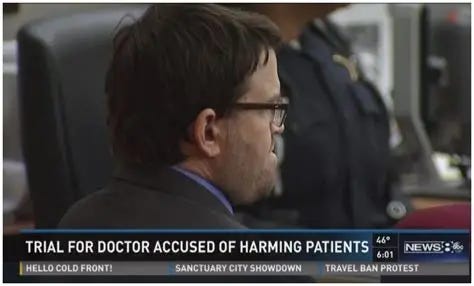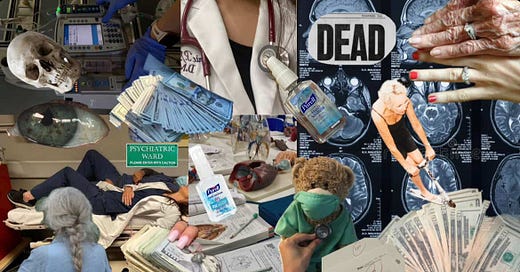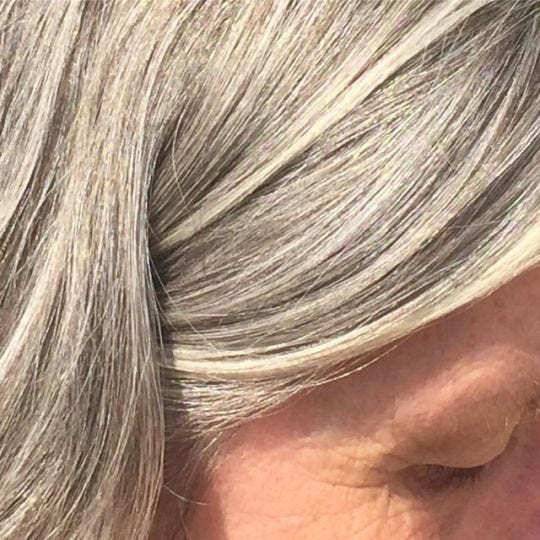medicine or money grab?
why i don't trust the healthcare system. sick, scammed, still standing.
I have fallen ill. Not in the whimsical, Victorian-fainting-couch sense, and no, not mentally either. I’ve long since made peace with my madness. In fact, I consider it part of my charm. But this time, it was corporeal. Flesh and bone. The kind of physical agony that makes you reconsider all your life choices, including the ill-advised one to ignore it for several months.
Monday morning, I awoke in a state of pain so excruciating that I had no choice but to do the unthinkable: I voluntarily went to the doctor. Yes. Me. In a waiting room. With other sick people. Like some sort of commoner.
“I don’t believe in doctors,” I confessed to my best friend as we sat in her car. She glanced back at me, utterly incredulous. “Juliet, you do know I’m a medical student, right? Like, I’m literally studying to become a doctor.”
I realize how privileged I am to say I don’t believe in doctors. And that’s when it hit me. I sounded like one of those people. You know, the ones who think turmeric can cure bone fractures and that hospital gowns are a government conspiracy. I could practically hear my friend’s voice ringing in my ears: “I’m sure all the kids in third-world countries wish they had doctors, Juliet.” She’s not wrong. I am, objectively, lucky. Fortunate to have access to healthcare, to have people in my life who know how to pronounce “gastroenterologist,” and to live in a country where you can book a doctor’s appointment online instead of through smoke signals. And don’t get me wrong, I deeply respect healthcare workers. My sister, who’s two years old and disabled, has made hospitals and clinics a second home for my family. I get it. Doctors matter.
I woke up Monday morning, in crippling pain that I had been ignoring for months and decided fine. It’s the system I take issue with. The endless bureaucracy, the waitlists, the cold fluorescent lighting, the weirdly judgmental way the receptionist looked at me when I said I hadn’t been in for years. Like, sorry Sharon, some of us have lives to get on with. You guys are closed on weekends and those are the only days I’m not stuck in an office from 9-5.
Growing up, my mother treated clinics like biohazard zones. “If you go where the sick kids are, you’ll just come out sicker,” she’d warn, like I was planning a field trip to Chernobyl. So, we didn’t go. Ever. My childhood was a blur of home remedies, prayer, and avoidance. My parents were also proudly anti-vax and convinced that Big Pharma was some shadowy cabal plotting to inject us with mind-control serum.
Naturally, I grew up deeply skeptical of the entire healthcare system. Doctors weren’t healers in our household. They were agents of unnecessary panic, overpriced prescriptions, and suspicious needles.
It wasn’t until now, at 19, that I’ve been granted the mythical artifact known as health insurance. Not through some rite of passage or family support, but courtesy of my first real job. A corporate blessing wrapped in HR paperwork. Suddenly, I exist in the system. I can flash an insurance card instead of relying on Reddit and existential dread to diagnose my symptoms. I call my manager, “I’m so sorry, I can’t come in,” she kindly says it’s fine. Get better soon! (And don’t bring whatever the hell you have in this office!)
I walk through the clinic doors already regretting every decision that led me here. Ignoring my symptoms, making the appointment, waking up…and immediately get stuck behind the human equivalent of a buffering YouTube video. This poor woman is clutching her stomach, dry heaving up the stairs like she’s starring in a low-budget horror film. It’s dramatic, it’s uncomfortable, and of course, I’m right behind her with front-row seats.
At the desk, the receptionist greets us with a look that says, “I hate this job, but my nails look amazing.” Her acrylics are three inches long and hit the keyboard with enough force to set off car alarms. Each keystroke sounds like gunfire in a library. She sighs, clicks around like she’s trying to break the computer on purpose, and then calls out with the compassion of a DMV employee on their last hour of a double shift: “NEXT!”
I go forward and take some hand sanitizer that’s on the desk, “Hi, I’m Juliet. My arrival time is 8:00.” Without looking at me, she pulls up my file and suddenly decides that privacy is a luxury she simply cannot afford today. She starts reading out loud everything I wrote on my online intake form, like she’s narrating the world’s most dreadful audiobook.
I swear every cough in the waiting room stops just to listen.
“Yes,” I mutter, trying not to combust from secondhand embarrassment. “That’s me.” She tells me that I owe $180 just for setting foot in the establishment. I hand over my card. I feel like I’m in trouble. She points to some seat between two old guys with runny noses, “SIT.” And so I do silently, shamefully surrounded by germs, judgment, and the sound of my own internal monologue screaming, “I told you not to come here.”
An eon passes by before the white double doors open and an underpaid medical assistant calls my name. I grab my purse, stand up and walk through the doors into the sterile hell. Like I’m being summoned for judgment and follow her into the fluorescent-lit purgatory known as the back office. Everything smells faintly like antiseptic and despair. She runs through the script in a tone that suggests she’s done this 70 times today. She disappears, leaving me alone on the world’s most uncomfortable paper-covered table, surrounded by diagrams of intestines, lungs, and diseases I’m suddenly convinced I have. I feel like one of those dogs that whines when they hear the word vet. I Or like a toddler who needs a lollipop, a cartoon, and three nurses to be successfully distracted before getting jabbed with a needle. That’s me. Full-grown, allegedly adult, and trying not to bolt from the exam table.
He gives me the usual routine: listens to my symptoms, nods seriously a few times, presses on my stomach like he’s trying to summon ancient spirits, and then, with a flourish, gives me The Diagnosis™. I'm practically glowing with hope. I’ve made it through the gauntlet. I faced my fears. I suffered through fluorescent lighting, judgmental stares, and a blood pressure cuff that nearly amputated my arm. Surely, I’m about to receive some rare, powerful, prescription-grade elixir that will vanquish whatever has been tormenting my body for months.
And then - the betrayal.
I get to the pharmacy, ask for my prescription, and the tech casually hands me a tiny bag of medicine I recognize immediately.
“Wait,” I say, staring at the label. “This is… over-the-counter?”
“Yup,” she says. “You could’ve grabbed it off the shelf, actually.”
I just… blink. Off the shelf? You mean to tell me I went through all of that - weeks of pain, the internal battle to overcome my doctor-phobia, the Kafkaesque front desk experience, the soul-sucking wait, the exam room interrogation…for something I could have purchased next to the allergy meds and breath mints at CVS?!
Excuse me, Your Honor, but I have been scammed. All this time, I could’ve just Googled my symptoms, walked into a store, and cured myself with a $12 box of generic pills instead of sacrificing my dignity on the altar of healthcare bureaucracy. I was literally up the night before, Googling my symptoms and I KNEW WHAT I HAD ALREADY. Ugh, can you see my frustration? Do you understand my dilemma? I took off work for this?
I go home and do what any rational thinking adult would do. I strip off every article of clothing and stand in front of the mirror, naked and seething. I stare at my body. This stupid, fragile, traitorous flesh prison. My pathetic reflection glares back, looking exhausted, bloated, and absurdly human. I want to scream at it. Curse it. Hurt it. Why now? Why wait until I’m finally inching toward stability to start falling apart? Why betray me like this, after everything we’ve been through? I retreat to the only place that still feels remotely safe: the shower. I curl up on the cold tile floor, knees pulled tight to my chest like I’m trying to become smaller than the pain. The water runs over me, indifferent, as I cry in quiet gulps.
I cry because, against all my instincts and inherited paranoia, I went to the doctor. I cry because the whole experience cost me about the same as a full day’s work - gone in a matter of minutes and for nothing. I cry because my body is still hurting, and there’s no villain to blame except the very skin I’m living in.
Now that I’m done being dramatic. The medicine is working wonderfully. I went back to work the next day.
grieving my younger self.
This is the part that no one tells you about growing up, about aging. Everyone talks about wrinkles and back pain, but no one talks about the grief. The mourning of your younger body. The betrayal you feel when something breaks or stops working the way it used to. I’m nineteen, barely two decades into this life, and already my body is showing signs of wear. Not in catastrophic ways, just in the quiet, chronic ones. The dull aches, the stiffness, the fatigue that wasn’t there before. And every time I feel it, I feel like I’m losing something.
doctor death
Have you heard of Dr. Death? Real name: Christopher Duntsch. A neurosurgeon in Dallas who operated on dozens of people - paralyzing some, killing others. And got away with it for years. Not because no one noticed. Plenty of people noticed. Nurses reported him. Fellow surgeons warned hospitals. Patients begged to be taken seriously. But he kept getting shuffled around, given fresh starts, protected by the very system that’s supposed to keep people safe. Why? Because calling out a bad doctor is bad business. Because lawsuits are expensive. Because reputations matter more than lives.
This is the part that makes my skin crawl. It wasn’t merely a single rotten apple, it was an entire orchard left to decay, complicit in its own rot.
And look, I’m not saying every doctor is a secret sociopath with a scalpel. I know that most are doing their best in a broken system that burns them out, buries them in paperwork, and rewards speed over care. But the system itself? That’s what I don’t trust. The one where a man like Duntsch can maim 30+ people before anyone takes meaningful action. The one where you need insurance just to get in the door. The one where Black patients are less likely to be believed about their pain. Where women are told they’re “probably just anxious.” and “you might want to lose some weight…” Where poor people are told to wait until it’s really bad before seeking help. And when it is really bad, it’s too late…or too expensive to fix.
This is the reality we don’t talk about: Healthcare in America doesn’t always heal. Sometimes it harms. And even when it doesn’t, it drains you. Of your time, your dignity, your paycheck. You show up vulnerable, and the system meets you with a clipboard, a copay, and a timer.

the gift of aging.
But even that, the ability to grieve your body as it changes, is a privilege. So many people don’t get to grow old. They don’t get to complain about knee pain or high blood pressure because their lives were cut short by a system that failed them harder and faster than it failed me. Black bodies. Poor bodies. Disabled bodies. Trans bodies. Bodies that didn’t look the way a chart said they should. These people don’t get the benefit of early diagnoses or preventative care or “Let’s just keep an eye on that.”
They get overlooked. Misdiagnosed. Dismissed. And then blamed.
And as a woman? That grief of my younger body comes with an edge. Because we aren’t just taught that aging is inevitable, we’re taught that it’s unforgivable. many women don’t get to grow old. They are taken by violence, by disease, by systemic neglect, by a world that too often tells them their lives are disposable. To grow older, aches and all, is proof that we survived. That we are surviving. And maybe even becoming more ourselves in the process.
I’m learning that grief and gratitude can coexist. That I can mourn what my body used to be while still honoring what it is now, what it’s doing for me every single day, even when it hurts. Even when it falters. Even when it needs help, and I hate asking for it.
We live in a world where men are allowed to age like fine wine, while women are warned that every wrinkle is a failure. That gray hair is neglect. That soft stomachs and sagging skin mean you’ve “let yourself go.” Aging isn’t just a natural process - it’s a battle, and the world expects us to lose quietly, covered in retinol, botox, and shame.
So no, I don’t hate doctors. I hate the system they’re forced to operate within. I hate that healthcare in this country isn’t built to heal, it’s built to filter. To decide who is worthy of help and who should suck it up. I hate that wellness is a luxury, not a right. I hate that the price of being taken seriously is so often your time, your dignity, and your paycheck. I mean…I paid $180 to be told to buy ibuprofen.







Very well written!
thank you for sharing, your writing is a joy to read (in the least narcissistic way possible it reminds me a bit of my own style haha) I have chronic illnesses and my own grief with the medical system. it's difficult to voice some of these thoughts without needing to provide too many specifics about my health that I don't want to, and I'm grateful that you have done so so eloquently <3